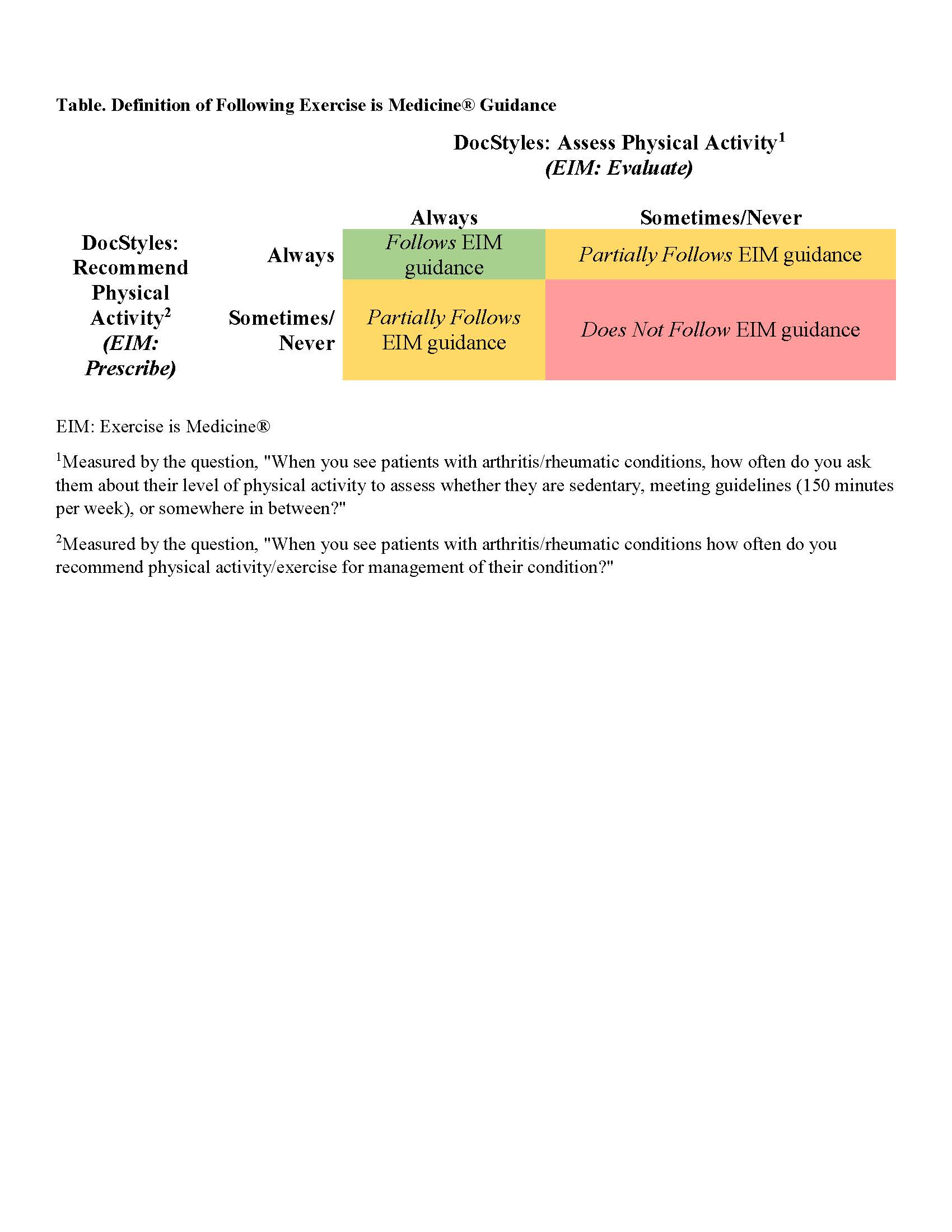Session Information
Session Type: Poster Session (Sunday)
Session Time: 9:00AM-11:00AM
Background/Purpose: Physical activity (PA) can reduce pain, prevent or delay disability, and improve physical functioning and mood in people with arthritis. However, only 36% of US adults with arthritis met the 2008 Physical Activity Guidelines for Americans aerobic guideline. The American College of Sports Medicine’s global initiative, Exercise is Medicine® (EIM), encourages health care providers to perform PA evaluations and refer patients to evidence-based PA programs or fitness professionals to manage chronic conditions, including arthritis. Primary care providers (PCPs) frequently treat rheumatologic conditions and are well positioned to influence patient PA through counseling consistent with EIM guidance. This study examined PA counseling behaviors for patients with arthritis among PCPs, and how adoption of EIM guidance for PA counseling differed across PCP characteristics.
Methods: We analyzed 2018 DocStyles cross-sectional data from 1,389 PCPs (family practitioners, internists, obstetrician/gynecologists [OB/GYNs], and nurse practitioners). PCPs were asked about frequency of assessing and recommending PA to their patients with arthritis, which align with the evaluation and prescription components of EIM guidance, respectively. Responses were classified into three counseling levels: Does Not Follow, Partially Follows, and Follows EIM guidance (Table). Prevalence and 95% confidence intervals (CIs) were calculated for each level overall and across selected PCP characteristics. Differences between PCP subgroups were determined using pairwise t-tests and linear trends in ordinal variables using orthogonal linear contrasts.
Results: PCPs most commonly reported that they Follow EIM guidance for their patients with arthritis (39.7% [95% CI: 37.2-42.3]), while 27.4% (95% CI: 25.0-29.7) Partially Follow and nearly a third (32.9% [95% CI: 30.4-35.4]) Do Not Follow EIM guidance. Prevalence of PCPs who Follow EIM guidance rose with increasing provider age (range: 32.8% among aged 21-39 years to 47.3% among aged > 50 years), years practicing medicine (range: 32.4% among practicing < 10 years to 51.0% among > 30 years), and number of total patients (range: 35.3% among < 75 patients to 46.4% among > 125 patients) and patients with arthritis seen per week (range: 30.2% among 1-9 patients to 56.4% among > 20 patients). Prevalence of PCPs who Do Not Follow EIM guidance was highest among OB/GYNs (49.5% [95% CI: 42.2-56.7]), those working in inpatient settings (41.7% [95% CI: 33.8-49.6]), those seeing fewer patients (1-9/week) with arthritis (41.3% [95% CI: 37.4-45.2]), younger providers (21-39 years) (39.9% [95% CI: 34.3-45.5]), those practicing medicine < 10 years (37.8% [95% CI: 32.3-43.4]), or living in the South (37.7% [95% CI: 33.4-42.0]).
Conclusion: Only about 2-in-5 PCPs Follow EIM guidance for PA counseling for patients with arthritis. PCPs who Do Not Follow EIM guidance are younger, less experienced, and see fewer patients with arthritis per week compared to PCPs who Follow EIM guidance. These PCPs may benefit from additional training and education to help increase their confidence and skills in PA counseling for patients with arthritis.
To cite this abstract in AMA style:
Guglielmo D, Murphy L, Theis K, Helmick C, Omura J, Croft J. Exercise Is Medicine® in Primary Care Practice: Provider Characteristics and Physical Activity Counseling for Patients with Arthritis, DocStyles, 2018 [abstract]. Arthritis Rheumatol. 2019; 71 (suppl 10). https://acrabstracts.org/abstract/exercise-is-medicine-in-primary-care-practice-provider-characteristics-and-physical-activity-counseling-for-patients-with-arthritis-docstyles-2018/. Accessed .« Back to 2019 ACR/ARP Annual Meeting
ACR Meeting Abstracts - https://acrabstracts.org/abstract/exercise-is-medicine-in-primary-care-practice-provider-characteristics-and-physical-activity-counseling-for-patients-with-arthritis-docstyles-2018/

